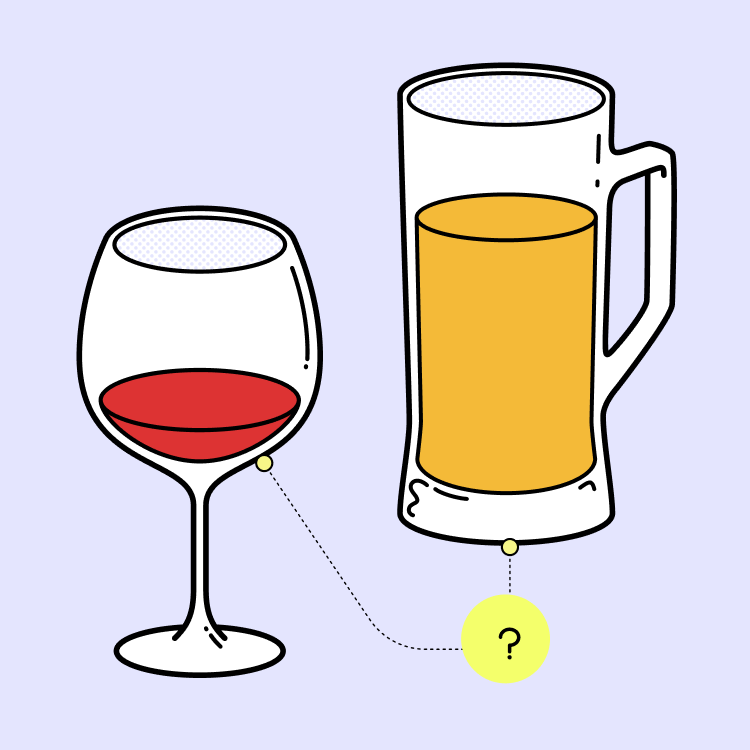-
維持平衡的生活方式有五個關鍵因素
幾項重大醫學研究確定了維持平衡生活方式的五個關鍵因素。 它們是:不吸煙、健康飲食、大量運動、保持健康的體重以及不過量飲酒 (1, 2)。
當然,還有其他因素可以維持平衡的生活方式,例如獲得充足的睡眠以及避免使用違禁藥物和濫用某些處方藥。 對大多數人來說,堅持這五個關鍵的生活方式因素,同時避免濫用藥物和其他危險行為,可以降低患上慢性(或非傳染性)疾病的機率。
-
避免大量飲酒是平衡生活方式的支柱之一
對於某些人來說,飲酒可以成為平衡生活方式的一部分,也是慶祝和紀念社交場合的一種方式 (3)。 大量飲酒,無論是長期大量飲酒還是酗酒,都會增加罹患各種疾病的風險 (4)。 另一方面,研究表明,適度飲酒可以改善某些人 (9, 10) 的心臟健康 (5, 6),並有助於預防糖尿病 (7, 8)。
但是每個人都是不同的,因此,適度飲酒是否可以成為平衡生活方式的一部分取決於您的體質。 醫生可能會建議酒精依賴者 或有酒精使用障礙家族史的人完全不要飲酒。 即使少量飲酒也會增加女性罹患乳腺癌的風險 (9, 10)。 確定適度飲酒是否符合平衡生活方式的最佳方法是與健康專家進行討論。
-
平衡的生活方式還包括心理和情緒健康
壓力和焦慮對身體的損傷不亞於身體疾病。 有些人透過增加飲酒量來應對壓力以及處理情緒問題 (11)。 這樣會導致酗酒問題,並對健康產生持久影響。 避免可能破壞身心平衡的行為對保持健康至關重要。
可以,但取決於許多因素,例如您的家族史和心理健康狀況。 這裡有三點需要注意。

圖片來源 - 平衡規律的生活方式可以飲酒嗎?
有用的資源
中華民國衛生福利部國民健康署-健康學習資源-文宣手冊-健康手冊專區國民飲食指標手冊(登載日期:民107年10月),(檢索日期:May. 04, 2021),檢自:
https://www.hpa.gov.tw/
中華民國衛生福利部國民健康署健康九九網站 酒精與精神健康手冊(登載日期:民103年12月),(檢索日期:May. 04, 2021),檢自:
https://health99.hpa.gov.tw/
References
- Yu, E., et al., Diet, Lifestyle, Biomarkers, Genetic Factors, and Risk of Cardiovascular Disease in the Nurses' Health Studies. Am J Public Health, 2016. 106(9): p. 1616-23.
- Mostofsky, E., et al., Key Findings on Alcohol Consumption and a Variety of Health Outcomes From the Nurses' Health Study. Am J Public Health, 2016. 106(9): p. 1586-91.
- Sayette, M.A., The effects of alcohol on emotion in social drinkers. Behav Res Ther, 2017. 88: p. 76-89.
- National Institute on Alcohol Abuse and Alcoholism (NIAAA). Alcohol's Effects on the Body. 2020; Available from:
- Ronksley, P.E., et al., Association of alcohol consumption with selected cardiovascular disease outcomes: a systematic review and meta-analysis. Bmj, 2011. 342: p. d671.
- Kannel, W.B. and R.C. Ellison, Alcohol and coronary heart disease: the evidence for a protective effect. Clin Chim Acta, 1996. 246(1-2): p. 59-76.
- Li, X.H., et al., Association between alcohol consumption and the risk of incident type 2 diabetes: a systematic review and dose-response meta-analysis. Am J Clin Nutr, 2016. 103(3): p. 818-29.
- Neuenschwander, M., et al., Role of diet in type 2 diabetes incidence: umbrella review of meta-analyses of prospective observational studies. Bmj, 2019. 366: p. l2368.
- Bagnardi, V., et al., Alcohol consumption and site-specific cancer risk: a comprehensive dose-response meta-analysis. Br J Cancer, 2015. 112(3): p. 580-93.
- International Agency for Research on Cancer (IARC), Alcohol Consumption and Ethyl Carbamate, in IARC Monographs on the Identification of Carcinogenic Hazards to Humans. 2010, IARC: Lyon.
- Keyes, K.M., et al., Stress and alcohol: epidemiologic evidence. Alcohol Res, 2012. 34(4): p. 391-400.





